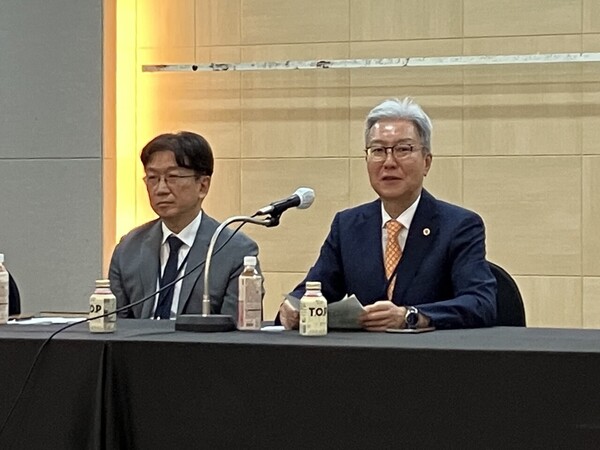As part of its comprehensive plan to prevent and manage hospital-related infections, the government's facility standards for hemodialysis units put too much emphasis on the infection control aspect, experts pointed out.
For dialysis patients to receive stable treatment, they emphasized that it is imperative to strengthen staffing standards for artificial dialysis facilities.

The Korean Society for Dialysis Therapy stressed the need to establish hemodialysis unit facilities and operating standards at a news conference during its regular symposium at The K Hotel in Yangjae-dong, southern Seoul, on Sunday.
"The number of dialysis patients in Korea is increasing significantly, medical expenses are exceeding 3 trillion won ($2.27 billion) a year, and survival rates are low due to aging and complications, such as cardiovascular disease, said Kim Seong-nam, the society’s chairperson. “So, professional quality management is important."
Kim noted that many foreign countries have laws or installation standards for personnel, facilities, equipment, and operations of hemodialysis units or have institutionalized quality management through the certification system.
“However, Korea has no such standards and relies on the self-management of each unit," Kim pointed out.
According to the society, attempts have been made to establish operational standards, including personnel and facilities, for hemodialysis units by law. In 2011, the society conducted a study with the Ministry of Health and Welfare but stopped short of institutionalizing it.
In 2019, Rep. Shin Sang-jin of the then Liberty Korea Party proposed the “Chronic Kidney Disease Management” bill to establish a comprehensive national management plan for chronic renal ailments. However, the discussion failed to progress due to the opposition that it was not a general but a particular bill for a specific disease.
The society backed off somewhat this time, saying that if it is difficult to enact a law, they must at least prepare recommendations. It cited the staffing standards as the most important factor among hemodialysis units' facilities and operating standards.
It also suggested that strengthening staffing standards could help eradicate “hemodialysis units at virtually for-profit clinics run by unlicensed owners.”
"The government and academia also agreed that facilities and operating standards are needed, and we should at least make recommendations and present them to the medical community," Kim said.
He noted that even now, hemodialysis units operated by semi-for-profit hospitals are a problem.
"If standards are created by focusing on facilities and equipment, these unlicensed hospitals will inevitably rank at high places. We don't want to give them a free pass," he said, "That's why staffing standards are important."
The dialysis society said that even if a recommendation is made to strengthen personnel standards, there will be no backlash from the field. It explained that staffing standards are already reflected as one of the indicators of the Health Insurance Review and Assessment Service (HIRA)'s “Outpatient Hemodialysis Appropriateness Assessment,”' and a flexible payment system is based on them.
It elaborated that the staffing standards for the appropriateness assessment include doctors specializing in hemodialysis and nurses with more than two years of experience.
"The personnel standards included in the appropriateness evaluation criteria were established with the mutual consent of the dialysis society and HIRA. Kim said no one has objected to them in the past 15 years of appropriateness evaluation. “That means they are accepted without any difficulty."
For dialysis patients to receive care safely, they must be treated in medical institutions with professional medical staff and appropriate facilities and equipment, Kim said.
"If we provide dialysis treatment without professional staff and proper operating standards, it will inevitably lead to harming patients," he added.

